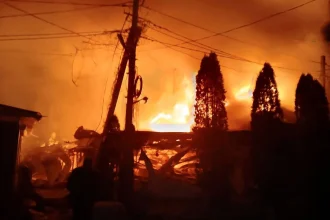The United States has presented new principles for a Middle East ceasefire, calling for the immediate release of hostages and the start of negotiations aimed at achieving a comprehensive end to the conflict, according to two Israeli officials familiar with the matter.
The proposal, which has already been communicated to Hamas through intermediaries, remains somewhat unclear, with questions over whether it represents guiding principles for renewed talks or a full ceasefire framework.
On Sunday, Hamas confirmed receipt of “some ideas” from Washington, describing them as steps toward a possible ceasefire and hostage arrangement. The group expressed willingness to engage, stating it “welcomes any initiative that contributes to halting the aggression against our people,” but insisted that any deal must guarantee Israel’s withdrawal from Gaza and establish a Palestinian-led committee to govern the area.
Hamas further demanded a “public and explicit commitment” from Israel to ensure the agreement is not reversed.
One Israeli official detailed that the U.S. plan envisions Hamas releasing all 48 hostages on the first day of the ceasefire, while Israel would halt its assault on Gaza City. Following this, direct negotiations for a full end to the war would begin, with fighting paused as talks proceed.
Former U.S. President Donald Trump, who has been heavily involved in mediation, pledged to uphold the ceasefire during negotiations.
“Everyone wants the hostages home. Everyone wants this war to end!” Trump wrote on social media Sunday night. “The Israelis have accepted my terms. It is time for Hamas to accept as well.” He described this message as his “last warning.”
Trump made the post while attending the U.S. Open in New York, accompanied by his son-in-law Jared Kushner and envoy Steve Witkoff, both active in Middle East peace efforts.
Following reports about the U.S. initiative, Prime Minister Benjamin Netanyahu’s office stated that Israel was “seriously considering President Trump’s proposal,” but hinted Hamas remained unlikely to agree. The timing and tone of the response indicated close coordination between Washington and Jerusalem.
The Hostages and Missing Families Forum welcomed the U.S. proposal, calling it a “true breakthrough” and urged Netanyahu’s government to fully back Trump’s efforts. They emphasized the urgent need to secure the release of surviving hostages and recover the remains of those deceased.
This development follows weeks of deadlock. Hamas had previously accepted a Qatar- and Egypt-brokered proposal for a 60-day ceasefire in exchange for hostages and prisoner releases, but Netanyahu rejected it, despite its similarity to a plan he had earlier supported. Instead, he demanded a broader deal addressing Israel’s wider war goals.
As the U.S. now pushes its own principles, Israeli officials remain uncertain whether Hamas will accept or reject the plan.










